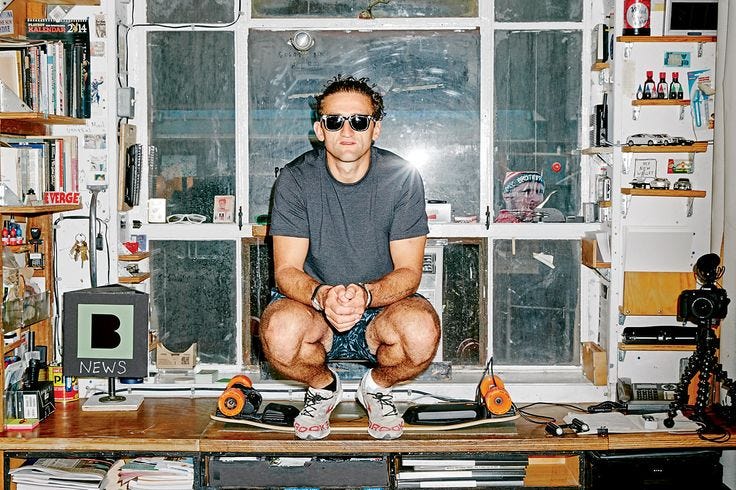Casey Neistat and the Creative Impulse
Chasing a Feeling—Not the Algorithm
Soulful greetings to all you thinkers and doers and mischief-makers!
This week on the Soul Boom podcast, Rainn sits down with none other than filmmaker, storyteller, entrepreneur, and all-around digital trailblazer Casey Neistat.
Rainn opens the conversation by sharing his deep admiration for Casey’s work—not just for its visual energy or viral reach, but for the why behind it all. He reflects on how creativity itself is a spiritual act, not unlike the creative force that brought the universe into being. That same impulse—the one that sparked stars into existence and carved the rivers of the Earth—is present in each of us when we feel called to express, to connect, and to make something meaningful.
Casey, in turn, shares an idea passed down from his brother (and fellow filmmaker), Van: the most powerful art is the kind that successfully transmits what the artist was feeling in the moment they made it. And in Casey’s work, you truly feel that, whether it’s a marathon video shot after 17 years of obsessive pursuit, or a short film capturing the vulnerable awe of fatherhood. The through line running through all his works is emotional honesty. His films resonate not because they’re optimized for clicks, but because they’re authentic. It’s this unvarnished, genuine rawness—this internal truth made visible—that forms the emotional spine of his creative process.
Casey isn’t chasing the algorithm. He’s chasing meaning. That alone sets him apart from much of YouTube culture. While many creators work backwards from what’s trending, Casey begins with what feels deeply personal. He’s not making content; he’s making sense of his life.
This principle—the artist as a vessel for emotional transmission—evokes something George Orwell once wrote about prose:
Good prose should be transparent, like a window pane.
In his 1946 essay Why I Write, Orwell argued that the best writing isn’t about dazzling technique or florid vocabulary. It’s about removing all the barriers between a thought and its expression, so the reader sees straight through to the idea. Casey’s best films do exactly that. The editing, the shots, the voiceover—all of it becomes invisible in service of the message. It’s not the craft we’re meant to notice; it’s the feeling behind the craft. When that’s done well, something profound happens: the audience isn’t just entertained, they’re moved. They feel what Casey felt. And that’s not just good storytelling—it’s a form of connection that borders on the sacred.
This clarity of expression—this transparency of spirit—becomes even more powerful when it’s aligned with a desire to do good in the world. Casey doesn’t broadcast virtue, but he lives by it. He’s turned down high-paying sponsorships that didn’t align with his values. And when he has done branded content, he turns it into high art—again an expression of his inner reality.
He’s chosen projects that feel good to him, even when they didn’t guarantee views or income. And now, with the privilege of financial freedom, he’s investing in work behind the scenes—tech, design, and infrastructure—that aims to make a meaningful difference.
When you create from a place of authenticity, and when that creation is aligned with conscience, you’re participating in something larger than yourself. It’s not about moral purity. It’s not about performance. It’s about integrity—the inside matching the outside.
Transformation—whether personal or societal—starts with small, authentic acts. A spiritual revolution doesn’t have to look dramatic. Sometimes it’s just a shift in intention: from chasing validation to offering something real. From optimizing for likes to optimizing for truth. From shouting into the void to whispering something honest that someone else might really need to hear.

That’s what Casey models. Whether or not a film goes viral, whether or not it earns a cent, when it’s rooted in honesty and offered with care, it becomes part of a different economy. Not the attention economy. The soul economy.
So here’s to transparent prose, honest frames, and art that is more windowpane than decoration. And to everyone out there making something from the inside out—keep going. The world needs more of that.
See you next week,
The Soul Boom Team




I’m a fan of American sociologist/professor/author Stanley Milgram (1933-1984), and much appreciate his Obedience Experiments’ findings. ... He’s also quoted as saying, “It may be that we are puppets — puppets controlled by the strings of society. But at least we are puppets with perception [and] awareness. And perhaps our awareness is the first step to our liberation.”
There’s a great lack of compassion in our world that’s accompanied by so very much anger or rage. I myself have been angrier over the last few years — perhaps in large part in relation to the Internet ‘angry algorithm’ sending me the stories, etcetera, it has (unfortunately correctly) calculated will successfully agitate me into keeping the (I believe, overall societally-/socially-damaging) process going thus maximizing the number of clicks/scrolls I’ll provide it to sell to product advertisers.
However, we, at least as individuals, can resist flawed yet normalized human/societal nature thus behavior; and if enough people do this and perform truly humane acts, positive change on a large(r) scale may result.
Thank you gents, needed to hear this right now. damn I love when the Spirit resonates into our lives in non expected ways. ✌🏽😎